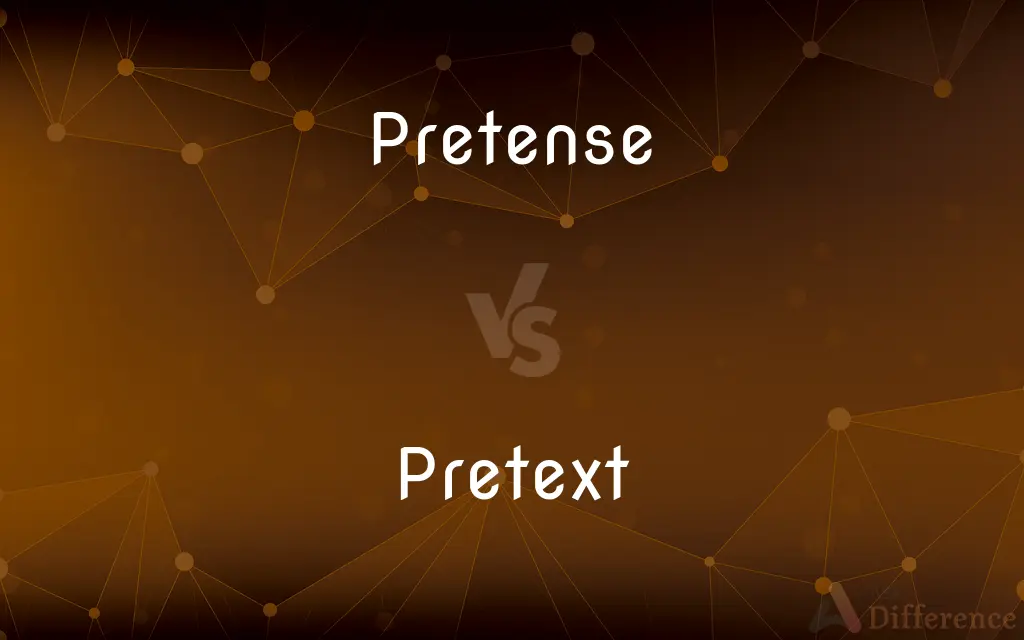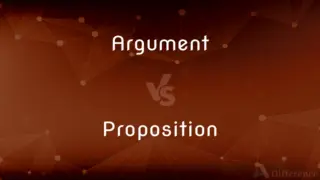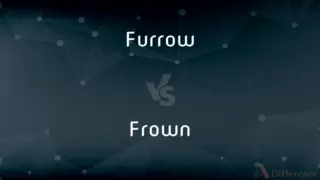Pretense vs. Pretext — What's the Difference?
By Fiza Rafique & Maham Liaqat — Updated on April 25, 2024
Pretense involves an act of deception through a false display, focusing on misleading appearances, while pretext is a fabricated reason or excuse used to conceal true motives.

Difference Between Pretense and Pretext
Table of Contents
ADVERTISEMENT
Key Differences
Pretense typically involves presenting oneself in a false or misleading way, usually to project an image or emotion that is not genuinely felt. This can include faking happiness or pretending to have certain qualifications. On the other hand, pretext is used as a misleading motive put forward to mask the real intention behind an action or decision. It often involves crafting a believable but false reason to justify certain behaviors.
In social interactions, pretense can be seen when individuals mimic attitudes or emotions to fit into a group or to gain favor. Whereas, pretext might be employed in scenarios where a person needs a socially acceptable reason for doing something that might be frowned upon if the true reasons were known.
Legal contexts might also employ these terms differently. Pretense can be referenced in cases of fraud where an individual has presented false information as true to deceive others. Conversely, pretext is often discussed in legal judgments when considering if actions were justified or if they were veiled attempts to cover up improper motives.
Literature and drama frequently explore the theme of pretense, where characters wear masks to hide their true selves, contributing to plot development and conflict. In contrast, pretext in literature might be used by characters to initiate a plot or maneuver around social constraints, thereby driving the narrative forward.
In psychological terms, pretense can be part of normal development, such as children engaging in pretend play. This contrasts with pretext, which does not typically have a developmental role but rather surfaces in situations requiring justification for actions that might otherwise be socially, morally, or legally questioned.
ADVERTISEMENT
Comparison Chart
Definition
An act of pretending; a false show of something.
An excuse or reason given to hide the true purpose of something.
Usage in Context
Often related to personal behavior and social interactions.
Typically used to justify actions or decisions in various contexts.
Connotation
Generally negative, implying deceit or falsehood.
Often negative, suggesting manipulation or concealment.
Psychological Role
Can be a part of normal behavioral patterns like play.
More strategic, used to create a cover for actual intentions.
Example in Literature
Used to develop complex characters or situations.
Drives plot by providing characters with reasons for actions.
Compare with Definitions
Pretense
An attempt to make something that is not the case appear true.
His calm was just a pretense to hide his anger.
Pretext
Using deceptive reasoning or excuses.
Under the pretext of security, he invaded her privacy.
Pretense
Acting as something or someone else to deceive.
She kept up the pretense of being interested in the conversation.
Pretext
An excuse that conceals true motives.
She offered a weak pretext for showing up late.
Pretense
Falsely displaying emotions or intentions.
Under the pretense of friendship, he gathered crucial information.
Pretext
A reason given in justification of a course of action that is not the real reason.
He used the meeting as a pretext to see her.
Pretense
Pretending with the aim of deceiving.
She used pretense to escape the awkward situation.
Pretext
A false reason that is used to hide the actual reasons.
His sudden concern is a pretext for his real agenda.
Pretense
A claim made or implied, especially one not supported by fact.
His pretense of ignorance was unconvincing.
Pretext
Something that is put forward to conceal a true purpose or object.
The call was just a pretext to check up on him.
Pretense
A false appearance or action intended to deceive
"He ran the back of his hand up her cheek, with the pretense of wiping away sweat" (Jonathan Safran Foer).
Pretext
A pretext (adj: pretextual) is an excuse to do something or say something that is not accurate. Pretexts may be based on a half-truth or developed in the context of a misleading fabrication.
Pretense
A professed but feigned reason or excuse; a pretext
Left the room under the pretense of having to make a phone call.
Pretext
A reason given in justification of a course of action that is not the real reason
The rebels had the perfect pretext for making their move
He called round on the pretext of asking after her mother
Pretense
Something imagined or pretended
"Ardor had atrophied and weariness had taken its place ... their connection was pretense" (Deborah Weisgall).
Pretext
A reason or excuse given to hide the real reason for something.
Pretense
The quality or state of being pretentious; ostentation
So modest as to be free from any hint of pretense.
Pretext
A false, contrived, or assumed purpose or reason; a pretense.
The reporter called the company on the pretext of trying to resolve a consumer complaint.
Pretense
A false or studied show; an affectation
Models making a pretense of nonchalance.
Pretext
To employ a pretext, which involves using a false or contrived purpose for soliciting the gain of something else.
The spy obtained his phone records using possibly-illegal pretexting methods.
Pretense
A claim or assertion to a right, especially a false one
"a celebrity with scarcely any pretense to talent or achievement" (Joseph Epstein).
Pretext
Something serving to conceal plans; a fictitious reason that is concocted in order to conceal the real reason
Pretense
(US) A false or hypocritical profession
Under pretense of friendliness
Pretext
An artful or simulated semblance;
Under the guise of friendship he betrayed them
Pretense
Intention or purpose not real but professed.
With only a pretense of accuracy
Pretense
An unsupported claim made or implied.
Pretense
An insincere attempt to reach a specific condition or quality.
Pretense
The act of laying claim; the claim laid; assumption; pretension.
Primogeniture can not have any pretense to a right of solely inheriting property or power.
I went to Lambeth with Sir R. Brown's pretense to the wardenship of Merton College, Oxford.
Pretense
That which is pretended; false, deceptive, or hypocritical show, argument, or reason; pretext; feint.
Let not the Trojans, with a feigned pretenseOf proffered peace, delude the Latian prince.
Pretense
Intention; design.
A very pretense and purpose of unkindness.
Pretense
The act of giving a false appearance;
His conformity was only pretending
Pretense
Pretending with intention to deceive
Pretense
Imaginative intellectual play
Pretense
A false or unsupportable quality
Pretense
An artful or simulated semblance;
Under the guise of friendship he betrayed them
Common Curiosities
Is using a pretext always unethical?
Not always; sometimes, pretexts are used to navigate socially delicate situations without causing harm.
Can pretense be harmless?
Yes, pretense can be harmless, such as in scenarios of polite social interactions or creative play.
How do pretense and pretext differ in psychological impact?
Pretense can often be linked to self-deception or denial, whereas pretext involves deliberate deception of others.
What is the main difference between pretense and pretext?
Pretense involves a false display or misleading appearances, while pretext refers to a fabricated reason to conceal true motives.
What are the ethical considerations of using pretense or pretext?
Ethical concerns arise when these mechanisms are used to deceive or harm others rather than for benign or creative purposes.
How are pretense and pretext used in literature?
Pretense is used to build character layers and complexity, while pretext often drives the narrative by setting up key plot points.
How do children use pretense in development?
Children use pretense in play to explore and understand the world around them and develop social skills.
Can pretext be a strategy in business?
Yes, businesses sometimes use pretext in marketing or negotiation tactics to achieve strategic goals.
In what scenarios is pretext commonly used?
Pretext is commonly used in legal, political, and social contexts to provide cover for controversial or unacceptable actions.
Are there positive uses of pretense in everyday life?
Yes, such as in acting or role-playing games where pretense enhances creativity and entertainment.
Can pretense lead to psychological disorders?
Persistent pretense might be symptomatic of deeper psychological issues but is not typically a disorder in itself.
What legal implications can pretense have?
In legal contexts, pretense can lead to charges of fraud or deceit if used to mislead or harm others.
Is there a psychological benefit to recognizing pretense and pretext in others?
Recognizing these behaviors can help in better navigating social interactions and protecting oneself from potential deception.
How can one identify if someone is using a pretext?
Critical observation and questioning the consistency of the stated reasons with actions can reveal the use of pretext.
What are common signs of pretense in behavior?
Inconsistency between words and actions, exaggerated expressions, and lack of congruence in emotions can indicate pretense.
Share Your Discovery

Previous Comparison
Argument vs. Proposition
Next Comparison
Furrow vs. FrownAuthor Spotlight
Written by
Fiza RafiqueFiza Rafique is a skilled content writer at AskDifference.com, where she meticulously refines and enhances written pieces. Drawing from her vast editorial expertise, Fiza ensures clarity, accuracy, and precision in every article. Passionate about language, she continually seeks to elevate the quality of content for readers worldwide.
Co-written by
Maham Liaqat














































